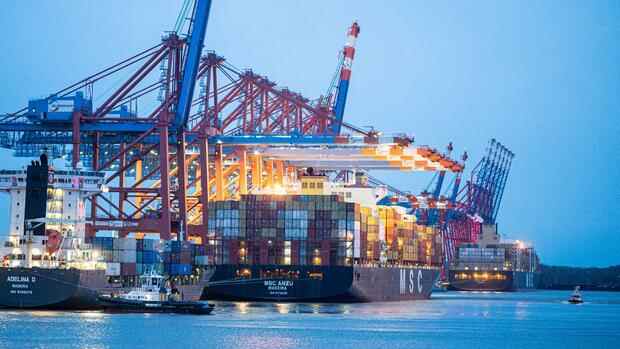The mood among German exporters plummeted after the outbreak of war in the Ukraine.
(Photo: dpa)
Wiesbaden, Berlin German exports unexpectedly rose to record levels in the month when Russia began war against Ukraine. They grew in February by 6.4 percent compared to the previous month to 124.7 billion euros, as the Federal Statistical Office announced on Monday. Compared to the same month last year, it was even 14.3 percent growth.
They grew, seasonally and calendar-adjusted, primarily due to business with the EU countries. Economists had expected growth of just 1.5 percent after a 3.0 percent contraction in January.
Imports also increased by 4.5 percent in February after having fallen by 4.0 percent at the beginning of the year. Experts had only assumed an increase of 1.4 percent here. Compared to the previous year, they even rose by 24.6 percent to a total of 113.1 billion euros.
In February, exports to Russia bucked the trend by 6.3 percent compared to the previous month, and imports by as much as 7.4 percent. “Foreign trade with Russia was only restricted from the end of February 2022 due to Russia’s attack on Ukraine and the sanctions imposed as a result,” the statisticians said.
Top jobs of the day
Find the best jobs now and
be notified by email.
The extent to which Western sanctions, other measures to restrict exports and unsanctioned behavior by market participants will continue to affect foreign trade with the Russian Federation will only become clearer from March, it said.
“Russia trade will literally collapse”
Experts expect strong slumps. “The negative foreign trade data with the Russian Federation in February is probably still relatively good compared to what will be published in the coming months,” said VP Bank’s chief economist, Thomas Gitzel. “Russia trade will literally collapse.”
In contrast, German exports to the EU countries grew by 10.4 percent in February compared to the previous month, those to the most important trading partner China by 6.4 percent and those to the USA by 2.7 percent.
However, things are unlikely to continue at this pace, because the mood among German exporters plummeted after the outbreak of war in Ukraine on February 24: the barometer for export expectations fell to minus 2.3 points in March after it had was still at plus 17.0 points, as the Ifo Institute found out in its monthly company survey.
So far, there has only been a sharper decline at the beginning of the corona crisis in April 2020. “Companies with economic ties to Russia in particular are much more pessimistic about the coming months,” said Ifo President Clemens Fuest. “Export growth will slow noticeably.”
More: Next shock for freight forwarders: price for diesel additive AdBlue jumps to record high
